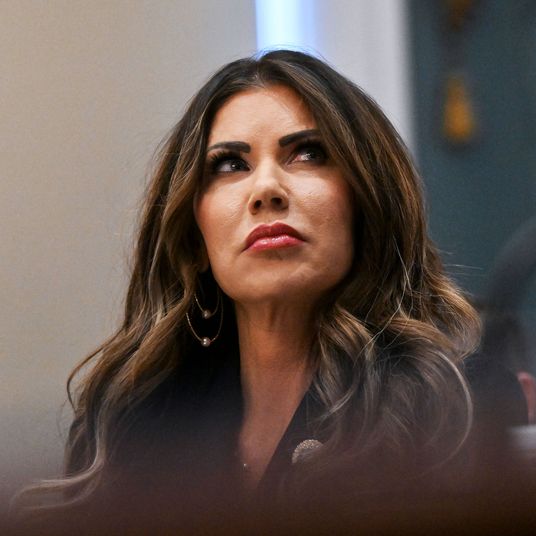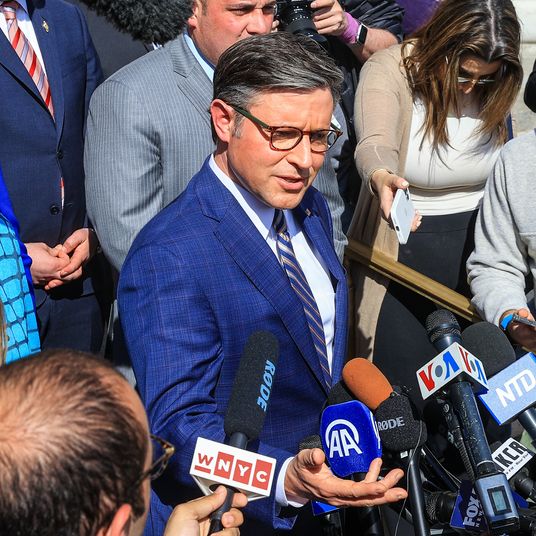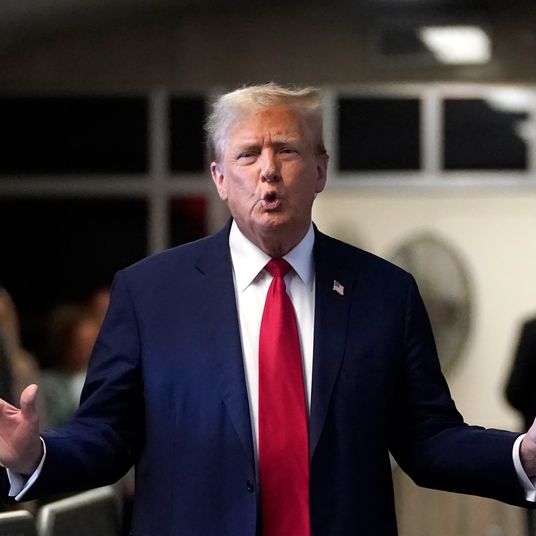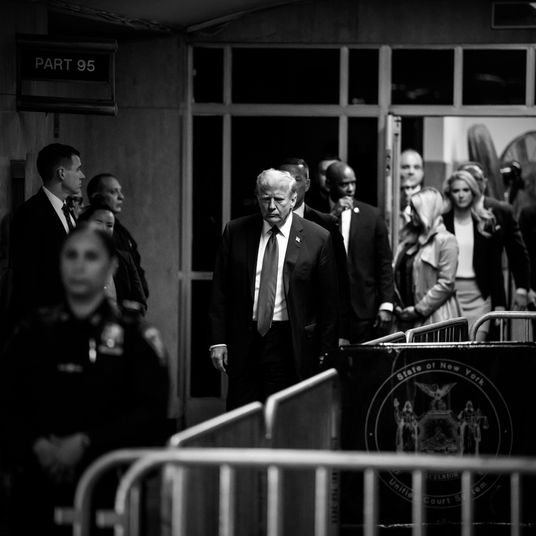
Back in the early days of the Trump presidency, various Republicans alarmed at the president’s increasingly erratic behavior — and their party’s growing acquiescence to it — started meeting in the basement conference room of a think tank not far from the Capitol. Many of them were already well known: Bill Kristol, the founding editor of The Weekly Standard; Evan McMullin, the former CIA officer who mounted a quixotic run for president as an independent in 2016; former Republican members of the House; Republican strategists turned cable-news pundits like Rick Wilson, Steve Schmidt, and Tim Miller. Concerned about whether Donald Trump would fire Special Counsel Robert Mueller, who was investigating his campaign’s ties to Russia, they did what any group of pundits and politicians would do: They released a public letter. “We hereby call on House Speaker Ryan and Senate Majority Leader McConnell to make clear, both publicly and privately, that they support the Mueller investigation …,” the letter read, sounding as if it were unscrolled at the blast of a trumpet. “We further urge all Republican members of Congress to issue public statements on these issues as well.”
As they soon discovered, Republicans wouldn’t stand up to Trump, and public letters and cable-news hits weren’t enough. If this group wanted to have an impact, it needed to do the stuff of politics, possibly even running a primary opponent against Trump in 2020. None, though, seemed to have the know-how or the energy to do it.
“It was very clear to me that Donald Trump was just a bad person, and I found it alarming to have a genuinely bad person running the country,” says Sarah Longwell, who attended those early meetings. “And I just have a very strong bias toward action, and I was in all of these rooms with Sad Republicans where everybody was very clear-eyed about the threat and why it was so upsetting, but nobody was really devising a plan on how to change it.”
Longwell was the head of the Log Cabin Republicans and had effectively blocked the group from endorsing Trump in 2016. She is mostly unknown to people in the D.C. political firmament. A lobbyist and strategist, she had built a career running PR campaigns for Rick Berman, a notorious lobbyist known as Dr. Evil, famous for his ability to create astroturf groups for unpopular causes designed to fight back against government agencies that wanted to clean the water we drink and the air we breathe. (In one famous example, Berman, on behalf of the alcoholic-beverage industry, created Beverage Retailers Against Drunk Driving to counteract what the industry saw as the excesses of Mothers Against Drunk Driving.)
“She kind of did what I thought everybody was going to do given the nature of the threat,” says Miller, who had worked on Jeb Bush’s presidential campaign. “She has this cozy corporate job that was only adjacent to conservative politics, but then Donald Trump won and she sprang into action. She was the one who was like, ‘Buck the fuck up. Let’s start something.’”
Today, Longwell sits at the center of a sprawling network of what were once known as Never Trump Republicans and are now better thought of as center-right Democrats and independents trying to rally the remaining persuadable members of the ideological tribe over to the cause of stopping Trump. She is the executive director of Defending Democracy Together, a group founded by Kristol in 2019 to defend norms and institutions. She also runs its political offshoot, Republican Voters Against Trump, which plans to pour $50 million this year into efforts to defeat the former president again. If that weren’t enough, she’s also the publisher of The Bulwark, the house organ of the Never Trump movement.
Longwell may be best known for her focus groups with Trump supporters that show up in many stories about the 2024 election. She hosts a popular podcast called The Focus Group that gives listeners a taste of what she has learned by speaking to these voters over the past seven years to find out why they backed Trump and what, in her view, can be done about it.
“There is a realignment that American politics is going through that I am trying to understand,” she says. The voters Longwell talks to are angry, sad, and feeling isolated from family and friends over political differences. “There is this old parable about how everyone has two wolves inside them, and which one wins? It’s the one that you feed. And right now, Donald Trump is feeding everybody’s worst impulses. One of the things Rick Berman taught me was that there are five dominant human emotions. It’s FLAGS: fear, love, anger, greed, and sympathy. But fear and anger are the ones that motivate people. And social media has allowed us to hypertarget people in ways that appeal to their fear and anger, and so now we have an American public that is scared and angry.”
Although it has now been some time since Longwell was a bona fide Republican, she has ideas gleaned from the focus groups of how to peel those on the fence about Trump over to the Democratic side. The key, she says, ironically, is not to convince them to like Joe Biden — for people who voted for Trump twice, that is never going to happen. Instead, it is to tell them they are right to think Biden is wrong on the border or taxes or the economy but that all of that pales in comparison to the peril that another Trump term would bring. “If you voted for Trump twice and you aren’t going to vote for him again, the reason is January 6th,” she says.
One such voter in a focus group I viewed is Matt, a middle-aged white man from Georgia, who, like other participants, consented to have only his first name used. “I wanted change like everybody else, wanted somebody that wasn’t a politician into the system,” he says. Trump was good for his business, he adds, and he couldn’t bring himself to vote for Biden in 2020. But even before the assault on the Capitol, Matt was tiring of Trump’s postelection antics: “To me, when he started [talking about] all the cheating and said, ‘I really won the election,’ and ‘I’m not leaving the White House pre–January 6th,’ that was it for me.”
Some Democrats think voters like Matt are key to the election, especially as Biden faces declining enthusiasm from core Democratic constituencies like voters of color and young people. It’s part of the reason that Biden has been hammering the point that a second Trump term would be a mortal blow to American democracy, or as he put it in March at the State of the Union, “Not since President Lincoln and the Civil War have freedom and democracy been under assault here at home as they are today.” Such rhetoric has unnerved some who have argued that the president’s efforts would be better spent on issues like health care, the economy, and abortion and not on what they say are abstractions like democracy. But operatives working with the Biden campaign say the focus is deliberate, referencing some of Longwell’s findings.
Longwell thinks a sizable portion of Republican voters may be up for grabs. She points to Nikki Haley getting 20 to 30 percent of the GOP primary vote against Trump, even after dropping out of the race. According to Longwell, that mirrors the percentage of Republican voters who say that the 2020 election was not stolen and the percentage who say they would definitely not vote for Trump if he were convicted of a crime. They can be divided into roughly three groups: Democrats who voted for Biden in 2020 but voted in a GOP primary to vote against Trump, Haley voters who are going to back Trump by the time November rolls around, and those who remain up for grabs. This last group made up between 5 and 10 percent of the primary electorate and consists of voters whom Democrats should focus their efforts on.
“I call them Normies,” Longwell says. “They aren’t Democrats. They are old-school Republicans, and they maintain their Republican registration and identity. I want to use the term kindly, but they are RINOs in the sense that they were Republicans — like, legit Republicans — but then the party changed. And so now they haven’t quite given up the brand, but they don’t like this Republican Party.”
These voters, according to Longwell, vote for normal Republicans, not ones who seem weird or extreme to them like Herschel Walker or Kari Lake or Blake Masters. They would be likely to vote for a No Labels ticket headed by Larry Hogan or Mitt Romney if such a one existed. “Up until Trump, they would have been pretty reliable Republican voters. They talk in the focus groups about Democrats being a little too woke, but at the same time they’re socially pretty moderate. They are pro-choice typically, but there’s things about the Biden administration and about Biden himself that they really struggle with. But they also really dislike Trump and dislike many of the policies,” she says. “They’re just kind of moderate centrist squishes. And this is a voter I identify with greatly, personally.”
Polling by Blueprint, a Democratic strategy firm funded by megadonor Reid Hoffman, found that in battleground states, all Haley voters break for Biden over Trump 45-24 with another 26 percent undecided. The report found they are aligned with Biden on issues such as abortion, democracy, Social Security, Medicare, and health care (though not energy production, immigration, and government spending). Converting a fraction of them would give Biden a “voting bloc that is significantly larger than the 2020 margin of victory” in states like Georgia and Michigan that will decide the election, according to the firm.
For many Republicans, this is nothing more than a Democratic false hope. If Biden outperformed Trump in their respective primaries, it is only because Trump faced real opposition from Haley, while Biden faced Dean Phillips and Marianne Williamson. “It just all seems a little far-fetched,” says Patrick Ruffini, a Republican pollster. “If Gretchen Whitmer ran for the nomination, it would be a better comparison.” Besides, he points out, polls show that it is Biden, not Trump, who is bleeding support from his 2020 coalition.
For Longwell, the key to changing this dynamic is to do to Trump what Democrats did to Trump-like candidates like Lake, Walker, and Masters in the midterms: portray them as far outside the mainstream. “If voters are concerned about January 6th, you have to use that to show what a Trump second term is going to be like, which is that he is going to be a lunatic surrounded by lunatics,” she says. “The other thing that I think is key for these voters is the fact that Donald Trump is not in it for Americans. He’s in it for himself. People cannot tell these court cases apart, but they can understand that Donald Trump is running for himself to stay out of jail and because he needs money.”
In her focus groups, Trump-Trump-Biden voters seemed to get this with one saying that even Trump’s former Cabinet members “that he hand-chose, that worked with him on a daily basis that now want nothing to do with him” and who call him “unhinged” was enough to tip him into the Democratic column.
Kristol says the next order of business for him and Longwell is to roll out a group of “former Trump officials against Trump,” recruiting a group that could theoretically include not just his former vice-president but his former attorney general, two former secretaries of defense, his former secretary of state, two former national security advisers, two former chiefs of staff, two former communications directors, and other aides and advisers.
That there is now a slew of former administration officials opposed to Trump — but also almost no one else in the party who is — shows Kristol how the Never Trump movement has morphed since those early days of basement meetings. “This has been a much longer fight than we thought it would be,” he says. “We thought he was an aberration and that the Republican Party would limit his sway in a pretty big way. But he was more dangerous than we realized, more of a transformation of American politics than we realized, and more consequential than we realized.”





























